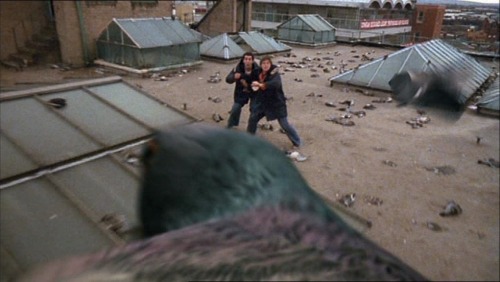#music film
The impersonation of disabled people for personal gain is a serious problem that needs to be addressed.
I am writing this post in lieu of two events: my witnessing of an interaction between a student who was faking a service dog and a university employee; and the release of Sia’s trailer for the film “Music.”
Those events may seem disconnected at first, as they did to me. But as I thought more deeply about both situations, something big stood out to me: in both cases, a nondisabled person was temporarily assuming the identity of a disabled person in order to generate some form of personal gain or profit.
I’ll go over the “service dog” interaction first, because it’s a story I haven’t told yet. Basically, last Tuesday I went into the Covid testing center on UVM’s campus. In line ahead of me was a fellow student who had a small lap dog on a leash. The dog was barking, yapping, running around, and jumping on the legs of workers at the testing center. It was incredibly disruptive, and honestly very irritating, especially since the student wasn’t doing anything to try and correct the dog’s behavior.
Nobody said anything to the student at first (the worker whose legs the dog jumped on didn’t even react), so I considered the possibility that pets were allowed in the building. The dog was so clearly not a service animal (bad behavior, lack of other identifying markers) that it just didn’t seem possible that people could notice and still do nothing to reprimand the student, if pets weren’t allowed in the building. But apparently someone eventually noticed, and called over an employee.
This was the conversation I observed between the student and the employee:
Employee: unless your dog is a service dog, it’s not allowed in the building. We don’t allow pets.
Student: oh I’m leaving anyway, so don’t worry about it.
Employee: okay but I’m just letting you know for future reference that unless your dog is like, a registered service dog, it’s not allowed in the building.
Student: she’s in training, does that count?
Employee: I don’t know the rules about being in training, I would have to ask, but-
Student: she’s also a registered therapy dog, if that helps.
Employee: I don’t know, I think it’s just service dogs but I’d have to check.
At this point in the conversation, I left the building. There were so many things wrong with this interaction, and there was so much ignorance on both sides, that I couldn’t handle it. I thought about going up to educate both of them, but that prospect was too overwhelming. I was obviously disabled at that moment, because I was using my forearm crutches. That made what I witnessed even more painful. This student felt comfortable impersonating someone like me, right in front of me.
And for those who aren’t aware of the laws around service dogs, here are all of the things that were wrong with that conversation:
1. In the United States, there is no such thing as a federal registry for service dogs. Organizations that claim to provide registration papers are fraudulent. So the employee was wrong to say that a service dog would have to be “registered.”
2.Legitimate service dogs (in training or not) can legally be kicked out of establishments if their behavior is disruptive (as this dog’s behavior was- barking and jumping on people), so the employee could have just told her to leave point blank.
3. Service dogs in training have full public access rights, but therapy dogs do not.An actual service dog handler would be aware of these laws and would not ask an employee questions about if they were allowed in the building or not. Additionally, this dog was clearly not being “trained” by the student in any way.
So from every available external indicator, this student was flustered when confronted about bringing her pet dog into the building, and therefore decided to pretend that she was disabled & had a service dog “in training.” The student benefited personally from implicitly lying about being disabled; avoiding the potential consequences of her actions by exploiting the ignorance and good nature of the employee.
Because disability is more fluid and often less obvious than other characteristics like skin color, body size, etc. it is easier for nondisabled people to impersonate us when it’s convenient or it benefits them in some way (with the assistance of plausible deniability).
Bring your pet dog into a building even though you’re not supposed to? It’s okay, just pretend to be disabled and say it’s a service dog. Want to make lots of money on a film about autism but can’t bother to spend time working on accommodating an autistic actor? It’s okay, just hire someone to pretend to be autistic instead. (/s)
The trouble with all of this is that disabled identity is being appropriated and used by nondisabled people to generate personal benefit and/or capital, all while actual disabled people remain marginalized. And the mis-appropriation of disabled identity creates false ideas in the public consciousness, about what disability is and how disabled people act.
People who fake having service dogs create situations in which actual handlers have trouble being taken seriously or gaining access to establishments. People who create films about the disabled experience without including disabled actors & writers create situations in which misconceptions and stereotypes about a certain disability are perpetuated and exaggerated.
The most disturbing thing about this dynamic is that disabled people are oppressed. It’s not like abled people are pretending to be us because they want to enjoy the sociocultural “benefits” of disabled life (there are none). We’re not an exalted category. We’re not nobles, or members of a high class. Rather, our lives and stories and meager legal protections are exploited by those who have no need to do so. Abled people are already advantaged, and they use our existence to further widen that gap in status.
I can’t stop being autistic when it’s convenient. I can’t stop being chronically ill when it’s convenient. I can’t stop having mobility issues when it’s convenient. This is my life every day. So to the student at the testing center, to Sia & Maddie Ziegler, and to every other abled person who’s put on a disabled persona: stop acting like this is your life when it’s not.
~Eden
SUBLIME CINEMA #607 - NOCTURNE
Sublime thriller by Zu Quirke, a director I know very little about except that I really like her name. It’s a kind of dark Whiplash / Black Swan hybrid, which is fitting since Blumhouse produced the film. It’s an elegant affair, with some careful and controlled performances and cinematography by Carmen Cabana.
Post link
SUBLIME CINEMA #602 - 24 HOUR PARTY PEOPLE
Michael Winterbottom can’t really be pinned down, he’s directed good and bad movies, but some are really distinctive. I love his collaborations with Steve Coogan, including this great Manchester music film and Tristram Shandy.
Plus Robby Muller shot this movie, so it’s full of smeared neon and beautiful color.
Post link




















